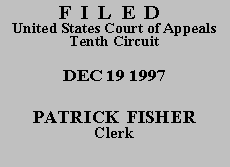

| UNITED STATES OF AMERICA,
v. CHARLES MARQUETTE JACKSON, |
No. 97-5136
(D.C. No. 97-CV-536-C) |
Jackson filed a pro se motion under 28 U.S.C. § 2255 on June 4, 1997, to vacate, set aside, or correct the sentence imposed upon him based on ineffective assistance of counsel at sentencing. Jackson argues that his counsel should have sought a downward departure for minor participation pursuant to U.S.S.G. § 3B1.2 despite Jackson's role as a major courier for drugs and money in the cocaine distribution conspiracy. Jackson also contends that his counsel should have sought a downward departure under 18 U.S.C. § 3553(f) and U.S.S.G. § 5C1.2 despite Jackson's criminal history category of III. Finally, Jackson complains that his counsel should have sought a reduction in his sentence due to sentencing disparity between Jackson and his codefendants despite Jackson's inability to show that any disparity actually exists.
Because Jackson filed his § 2255 motion on June 4, 1997, which was after the effective date of the Antiterrorism and Effective Death Penalty Act ("AEDPA"), 28 U.S.C.A. §§ 2254-66 (1996), the AEDPA provision requiring a certificate of appealability applies to Jackson's appeal. The district court denied a certificate of appealability in a July 10, 1997 order. Jackson now appeals the denial of the certificate of appealability. Finding no substantial showing of the denial of an important federal right or any other reason justifying further proceedings, we hereby deny a certificate of appealability.
The mandate shall issue forthwith.
ENTERED FOR THE COURT
David M. Ebel
Circuit Judge
*. After examining appellant's brief and the appellate record, this panel has determined unanimously that oral argument would not materially assist the determination of this appeal. See Fed. R. App. P. 34(f) and 10th Cir. R. 34.1.9. The case is therefore ordered submitted without oral argument. This order and judgment is not binding precedent, except under the doctrines of law of the case, res judicata, and collateral estoppel. The court generally disfavors the citation of orders and judgments; nevertheless, an order and judgment may be cited under the terms and conditions of 10th Cir. R. 36.3.